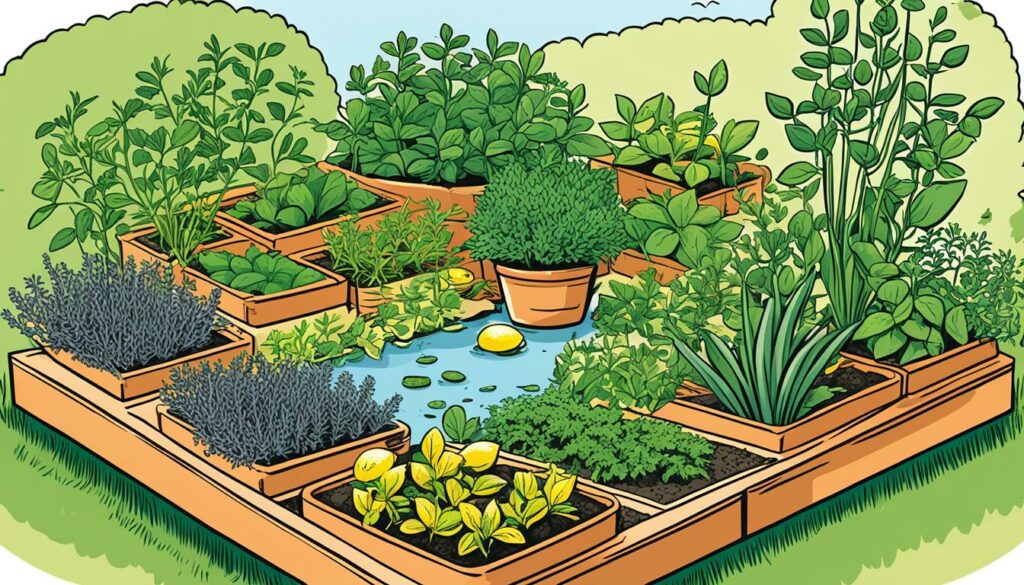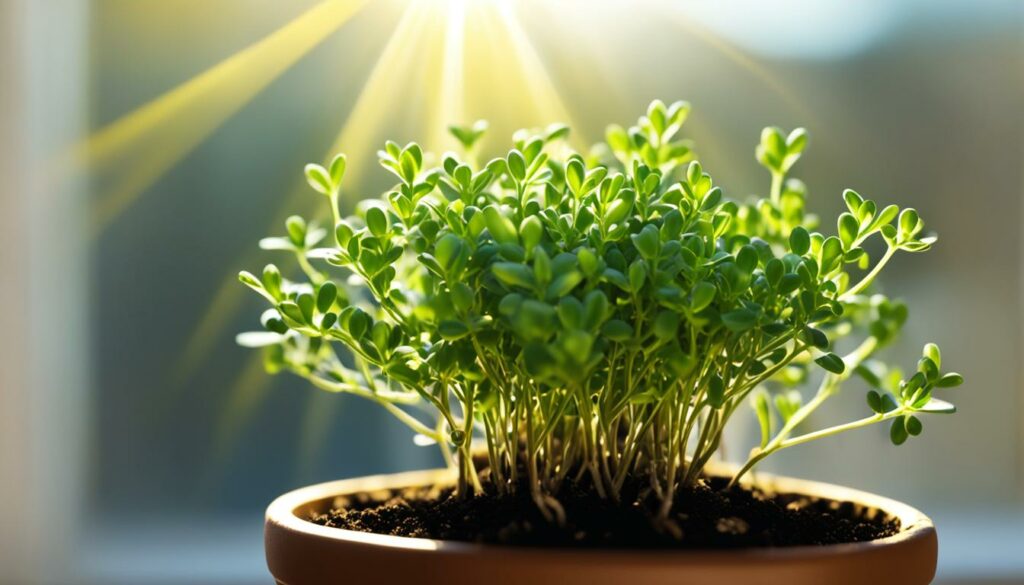Welcome to a world of culinary enchantment with lemon thyme. This versatile herb, known for its distinct citrusy flavor and aroma, can add a magical touch to your dishes. Whether you’re an experienced chef or a cooking enthusiast, exploring the uses of lemon thyme will allow you to create delightful culinary masterpieces.
From roasted vegetables to marinated meats, lemon thyme can elevate the taste of a wide range of dishes. Its bright, lemony notes bring a refreshing twist that will leave your taste buds craving for more. Discover the culinary wonders that lemon thyme can unlock and embark on a flavorful journey.
In this article, we will delve into the various applications of lemon thyme, exploring its uses in cooking, aromatherapy, herb landscaping, and more. You’ll uncover the secrets of growing and harvesting lemon thyme, as well as its potential benefits for your well-being.
So, whether you’re seeking to enhance your meals, create a fragrant ambiance, or beautify your garden, lemon thyme is here to inspire you. Get ready to unlock the culinary magic of lemon thyme and let your creativity flourish in the kitchen and beyond.
The Basics of Lemon Thyme: History and Varieties
Lemon thyme, with its distinct citrusy flavor and aroma, has been valued for centuries for its culinary and medicinal properties. It adds a refreshing twist to dishes and offers a range of benefits. This versatile herb has a long history, spanning different cultures and civilizations. Let’s explore the fascinating journey of lemon thyme and discover its unique characteristics.
Lemon thyme is known for its immune-boosting properties and potential to lower blood pressure. This herb is packed with essential vitamins and minerals that support overall health. Incorporating lemon thyme into your diet can help fortify your immune system and promote cardiovascular well-being.
In addition to its health benefits, lemon thyme adds visual appeal to herb landscaping. With its vibrant foliage and delicate flowers, it can enhance the beauty of any garden. Whether you’re a seasoned gardener or a beginner, lemon thyme is a great addition to your outdoor space.
The History of Lemon Thyme
Lemon thyme has a rich history that can be traced back to ancient times. It was used by the Egyptians for its aromatic properties and was often incorporated into embalming rituals. The Greeks and Romans believed that thyme conveyed courage and used it as a symbol of bravery.
Throughout history, lemon thyme has been prized for its culinary uses. It was a staple in medieval European kitchens and was commonly used as a preserving agent for meats. It was also used to add flavor to soups, stews, and roasted dishes.
Today, lemon thyme continues to be a beloved herb in cuisines around the world. Its unique citrusy flavor and aroma make it a popular choice among chefs and home cooks alike.
Varieties of Lemon Thyme
Lemon thyme belongs to the Thymus genus, which includes various species and hybrids. The two most common varieties of lemon thyme are:
- Lemon Thyme (Thymus x citriodorus): This variety has a bright lemon flavor and is commonly used in cooking. It has small, green leaves and produces delicate pink or lilac flowers.
- Golden Lemon Thyme (Thymus x citriodorus ‘Aureus’): This variety has the same citrusy flavor as lemon thyme but stands out with its golden-yellow foliage. It adds a pop of color to herb gardens and landscaping.
Both varieties of lemon thyme are versatile and can be used in a wide range of culinary creations.
| Variety | Flavor | Foliage | Flowers |
|---|---|---|---|
| Lemon Thyme | Bright lemon | Small, green | Pink or lilac |
| Golden Lemon Thyme | Bright lemon | Golden yellow | Pink or lilac |

Cultivating Lemon Thyme: From Garden to Kitchen
Growing lemon thyme is a rewarding experience that allows you to add a burst of citrusy flavor to your dishes. Whether you’re an experienced gardener or just starting out, this versatile herb is relatively easy to cultivate. By following a few simple steps, you can enjoy the vibrant aroma and taste of lemon thyme in your cooking.
Choose the Right Environment
Lemon thyme thrives in well-draining soil and requires full sun exposure for optimal growth. Select a spot in your garden or choose a container with adequate drainage to accommodate the herb’s needs.
Planting and Maintenance
Once you’ve prepared the soil or container, plant the lemon thyme seeds or seedlings at the appropriate depth. Keep in mind that lemon thyme can spread, so provide enough space for the plant to grow. Regular watering is crucial to keep the soil moist, but avoid overwatering as it can lead to root rot. Pruning the plant periodically promotes healthier growth and ensures a more compact shape.
When it comes to cooking, lemon thyme can be used fresh or dried. Harvest the herb by trimming the stems, making sure to leave enough growth for the plant to continue thriving. Rinse the sprigs and pat them dry before use. To dry lemon thyme, simply hang the sprigs upside down in a cool, well-ventilated area until they are fully dried. Store dried lemon thyme in an airtight container away from direct sunlight to preserve its flavor.
Recipes and Culinary Uses
Lemon thyme is a versatile herb that adds a delightful citrusy touch to a variety of dishes. Its bright flavor pairs well with roasted vegetables, grilled meats, and even desserts. Here are a few ideas for incorporating lemon thyme into your cooking:
- Infuse lemon thyme in olive oil or vinegar for a zesty marinade or dressing.
- Add fresh lemon thyme leaves to soups, stews, or sauces for an extra layer of flavor.
- Create a refreshing lemon thyme tea by steeping the sprigs in hot water.
- Combine lemon thyme with other herbs like rosemary and parsley to create a flavorful herb rub for meats.
- Sprinkle fresh lemon thyme on top of salads, pasta dishes, or roasted vegetables for a burst of citrusy goodness.
With its versatility and unique flavor profile, lemon thyme can elevate your culinary creations and bring a touch of freshness to your dishes.
Lemon Thyme in the Kitchen: Techniques and Pairings
When it comes to incorporating lemon thyme into your cooking, the possibilities are endless. This vibrant herb with its bright, lemony flavor can elevate a wide range of dishes, whether savory or sweet. Here are a few techniques and pairings to help you make the most of lemon thyme in your culinary creations:
Seasoning and Garnish
One of the simplest ways to use lemon thyme is as a seasoning or garnish. Sprinkle fresh lemon thyme leaves over roasted vegetables like potatoes or carrots to add a burst of citrusy freshness. You can also use it to garnish grilled meats or seafood, enhancing their flavors and presentation.
Infusions and Dressings
Lemon thyme can be used to infuse flavors into oils, vinegars, and dressings, giving them a zesty twist. Simply steep a few lemon thyme sprigs in olive oil or white wine vinegar for a few days to create a fragrant infusion. This infused oil or vinegar can be used in salad dressings or drizzled over dishes for an extra kick of flavor.
Marinades and Sauces
Combine lemon thyme with other herbs and spices to create delicious marinades and sauces. For example, mix lemon thyme with garlic, rosemary, and olive oil to make a savory marinade for chicken or fish. You can also add lemon thyme to creamy sauces or vinaigrettes to balance out the richness with its bright citrus notes.
Proper Timing and Quantity
When using lemon thyme in your recipes, it’s important to consider proper timing and quantity to preserve its delicate flavor. Add lemon thyme towards the end of cooking to retain its freshness and vibrant aroma. Start with a small amount and taste as you go, adjusting the quantity based on your preference.
Experiment with lemon thyme in your favorite recipes and discover the delightful flavors it can bring to your dishes. Its citrusy zest and aromatic charm make it a versatile herb that can take your culinary creations to new heights.

With its bright, lemony flavor, lemon thyme pairs well with a variety of dishes, from roasted vegetables to marinated meats. Incorporate it into your cooking and let the vibrant flavors of lemon thyme elevate your culinary experiences.
Lemon Thyme in Aromatherapy: Benefits and Uses
Lemon thyme essential oil is a powerful tool in the world of aromatherapy. Its energizing and uplifting properties make it a popular choice for invigorating the senses and promoting relaxation.
The scent of lemon thyme has been shown to have mood-boosting effects, helping to reduce stress and anxiety. By incorporating the aromatic benefits of lemon thyme essential oil into your daily routine, you can create a calming atmosphere and enhance your overall well-being.
There are several ways to utilize lemon thyme essential oil in aromatherapy:
- Diffusion: Add a few drops of lemon thyme essential oil to a diffuser, filling your space with its refreshing fragrance. This can help create a tranquil ambiance and promote a positive mood.
- Bath Products: Incorporate lemon thyme essential oil into your bath routine by adding a few drops to bath salts or a bath bomb. The warm water will help release the invigorating aroma, turning your bath into a rejuvenating experience.
- Massage Oils: Blend lemon thyme essential oil with a carrier oil, such as jojoba or almond oil, to create a fragrant massage oil. The soothing touch combined with the aromatic benefits of the oil can enhance relaxation and promote a sense of well-being.
When using essential oils, including lemon thyme essential oil, it is essential to dilute them properly. This ensures safe and effective use and minimizes the risk of skin irritation or sensitization. Always follow the guidelines for dilution ratios and use caution when applying essential oils topically.
Lemon Thyme Essential Oil Benefits
| Benefits | Uses |
|---|---|
| Energizing | Diffusion, inhalation |
| Uplifting | Diffusion, massage |
| Mood-Boosting | Diffusion, bath products |
| Calming | Diffusion, massage, bath products |

Growing Lemon Thyme: Tips and Tricks
When it comes to growing lemon thyme, providing the right conditions is essential to ensure a bountiful harvest and enjoy its numerous benefits. Here are some tips and tricks to help you cultivate healthy lemon thyme plants:
- Choose the right soil: Lemon thyme thrives in well-draining soil. Make sure to use soil that allows excess water to flow away, preventing waterlogged conditions that can harm the plants.
- Give it plenty of sunlight: Lemon thyme loves the sun! Plant it in an area that receives at least 6 hours of direct sunlight each day for optimal growth and flavor.
- Prune regularly: To promote healthy growth and prevent the plant from becoming too leggy, prune your lemon thyme regularly. This helps maintain its compact shape and encourages the growth of new leaves.
- Be mindful of watering: Lemon thyme is drought-tolerant and does not require excessive watering. Water the plants when the top inch of soil is dry, and always aim to keep the soil lightly moist, not soaked.
With these tips in mind, you’ll be able to cultivate thriving lemon thyme plants that will reward you with their delightful citrusy aroma and taste. Enjoy the journey of growing your own lemon thyme and reap the culinary and aromatic benefits it brings.
| Tips for Growing Lemon Thyme: | |
|---|---|
| Choose the right soil | Use well-draining soil to prevent waterlogging. |
| Provide ample sunlight | Ensure the plants receive at least 6 hours of direct sunlight each day. |
| Regular pruning | Promote healthy growth and prevent legginess by pruning lemon thyme regularly. |
| Mindful watering | Water the plants when the top inch of soil is dry, maintaining lightly moist conditions. |

“Cultivating lemon thyme requires attention to specific conditions like well-draining soil and ample sunlight. By pruning regularly and watering mindfully, you can enjoy a flourishing lemon thyme garden.” – Gardening enthusiast
Culinary Education and Lemon Thyme: Integrating Herb Knowledge
Culinary education programs recognize the significance of incorporating herbs like lemon thyme to elevate flavor profiles and create well-balanced dishes. By integrating lemon thyme into culinary education, aspiring chefs and home cooks can gain a deeper understanding of its unique characteristics and culinary potential. Cooking classes and workshops provide a platform to explore different techniques for utilizing lemon thyme in recipes, such as proper seasoning, pairing with other ingredients, and incorporating it into infusions and herb rubs.
When it comes to the culinary uses of lemon thyme, the possibilities are endless. Its fresh, citrusy aroma and flavorful taste can brighten up various dishes, adding a zesty twist. Whether you’re a professional chef or an enthusiastic home cook, understanding how to effectively incorporate lemon thyme into your culinary creations can significantly enhance the overall dining experience. From simple seasoning to complex flavor profiles, the versatility of lemon thyme lends itself well to a wide range of recipes.
Proper utilization of lemon thyme in cooking involves selecting the right amount and pairing it judiciously with other ingredients. The herb’s vibrant flavor can complement seafood, poultry, vegetables, and even desserts. Experimenting with different combinations and exploring creative ways to incorporate lemon thyme into your dishes will undoubtedly elevate your culinary skills.
Unleash the Full Potential of Lemon Thyme
“Lemon thyme adds a burst of citrusy flavor to dishes and can be used as a seasoning, garnish, or infusion. Its unique lemony profile enhances the taste of roasted vegetables, marinated meats, salad dressings, and more. The aromatic properties of lemon thyme can create a harmony of flavors when combined with other herbs, making it an invaluable ingredient in marinades and sauces.”
Restaurants, cooking schools, and culinary institutes actively promote the creative application of lemon thyme in various cooking techniques. Here is an example of a simple yet delicious recipe that showcases the culinary uses of lemon thyme:
| Recipe Name | Ingredients | Instructions |
|---|---|---|
| Lemon Thyme Roasted Chicken |
|
|
Image: 
As you embark on your culinary journey, remember that lemon thyme is more than just an herb. It’s a versatile ingredient that can enhance the flavors of your dishes and add a fresh, citrusy twist. By integrating lemon thyme into your culinary education, you’ll gain valuable knowledge and skills that will undoubtedly impress your guests and elevate your cooking to new heights.
Lemon Thyme in Herb Landscaping: Visual Appeal and Natural Repellent
Lemon thyme is not just a herb for your recipes; it also brings a touch of beauty to your herb landscaping. With its vibrant foliage and delicate flowers, lemon thyme adds visual appeal to your outdoor spaces, creating a stunning and inviting atmosphere. Whether you plant it in herb borders, use it as accents along pathways, or grow it in containers, this versatile herb will surely catch the eye of anyone who visits your garden.
But lemon thyme’s appeal goes beyond its aesthetics. The strong aroma of lemon thyme acts as a natural repellent, keeping unwanted insects like mosquitoes at bay. By incorporating lemon thyme into your herb landscaping, you can enjoy a fragrant and insect-free environment, allowing you to fully embrace your outdoor space without the annoyance of pesky bugs.

Whether you’re looking to create a picturesque herb garden or a cozy backyard retreat, lemon thyme is the perfect addition. Its visual charm and natural repellent properties make it a valuable herb for both aesthetic and practical purposes.
Lemon Thyme as a Companion Plant: Pest Control and Balance
Lemon thyme is not only a versatile herb for culinary and aromatherapy purposes, but it also offers additional benefits as a companion plant in herb landscaping. By incorporating lemon thyme into your garden, you can establish a balanced and harmonious environment that helps control pests and supports a thriving ecosystem.
The pest-repellent properties of lemon thyme make it an excellent companion for various vegetables and herbs. It naturally deters common garden pests, reducing the need for chemical pesticides and promoting organic gardening practices. By planting lemon thyme alongside your other plants, you can create a natural defense system that helps safeguard your garden from unwanted visitors.
Furthermore, lemon thyme attracts beneficial insects such as bees and butterflies. These pollinators play a crucial role in the reproduction of plants, ensuring healthy yields and bountiful harvests. By providing a welcoming habitat for these important creatures, lemon thyme contributes to the overall balance of your garden and promotes a thriving ecosystem.
Here is a table highlighting the beneficial insects attracted by lemon thyme:
| Insects | Role |
|---|---|
| Bees | Pollination |
| Butterflies | Pollination and aesthetic value |
As shown in the table, lemon thyme’s ability to attract bees and butterflies adds aesthetic value to your garden while ensuring effective pollination. This contributes to healthy plant growth and a more productive garden overall.

In addition to its culinary uses and its role in herb landscaping, lemon thyme also has potential for aromatherapy. The refreshing citrusy scent of lemon thyme essential oil can invigorate the senses and create a calming ambiance in your home or outdoor space.
Conclusion
Lemon thyme is a versatile herb that offers a range of uses and benefits. Its distinct lemony flavor and aroma make it a delightful addition to various culinary creations. Whether you’re seasoning roasted vegetables, marinating meats, or infusing dressings, lemon thyme adds a burst of citrusy freshness to your dishes.
Not only does lemon thyme enhance the flavor of your meals, but it also brings visual appeal to your herb landscaping. Its vibrant foliage and delicate flowers make for a stunning addition to gardens and containers. Plus, the strong scent of lemon thyme acts as a natural insect repellent, making it a valuable asset in maintaining a pest-free garden environment.
Whether you’re an experienced chef or a budding gardener, incorporating lemon thyme into your culinary and gardening endeavors can elevate your experience. Unlock the magic of this citrusy herb and enjoy its various benefits. From enhancing the taste of your favorite recipes to adding beauty and fragrance to your outdoor spaces, lemon thyme is a must-have herb for any kitchen and garden enthusiast.
FAQ
What are the culinary uses of lemon thyme?
Lemon thyme can be used as a seasoning, garnish, or infusion to enhance the taste of roasted vegetables, marinated meats, and salad dressings. It can also be combined with other herbs to create flavorful marinades and sauces.
What are the medicinal properties of lemon thyme?
Lemon thyme is known for its immune-boosting properties and potential to lower blood pressure. It has also been used in traditional medicine for its antiseptic, antifungal, and antispasmodic effects.
How can I use lemon thyme in cooking?
Lemon thyme can be used fresh or dried to add a burst of citrusy flavor to a variety of dishes. It pairs well with roasted vegetables, marinated meats, salad dressings, and more.
Can I use lemon thyme essential oil in aromatherapy?
Yes, lemon thyme essential oil is known for its energizing and uplifting properties. It can be used in aromatherapy to invigorate the senses, reduce stress, and promote relaxation.
How do I grow lemon thyme?
Lemon thyme thrives in well-draining soil and requires plenty of sunlight. It can be grown in containers or directly in the ground with regular watering and occasional pruning for healthy growth.
How can lemon thyme be used in culinary education?
Lemon thyme can be integrated into culinary education to help aspiring chefs and home cooks understand its unique flavor profile and culinary potential. It can be used in recipes, herb rubs, infusions, and more.
How can lemon thyme be used in herb landscaping?
Lemon thyme’s vibrant foliage and delicate flowers make it a great addition to herb landscaping. It can be planted in borders, used as accents along pathways, or grown in containers for visual appeal.
Can lemon thyme act as a natural repellent for insects?
Yes, the strong scent of lemon thyme acts as a natural repellent for insects like mosquitoes. By planting lemon thyme in your garden, you can help deter pests and maintain a healthy ecosystem.
Can lemon thyme be used as a companion plant?
Yes, lemon thyme is an excellent companion plant for vegetables and herbs. Its pest-repellent properties help deter common garden pests, while attracting beneficial insects like bees and butterflies for pollination.
Source Links
- https://medium.com/@AdelaideGirlsGarden/the-spice-cabinet-thyme-d7a63ed43d43
- https://www.savorysuitcase.com/thymes-role-in-culinary-workshops-and-cooking-classes/
- https://gardenvariety.com.au/product/from-kitchen-to-garden-exploring-the-benefits-of-lemon-thyme-in-herb-landscaping/


